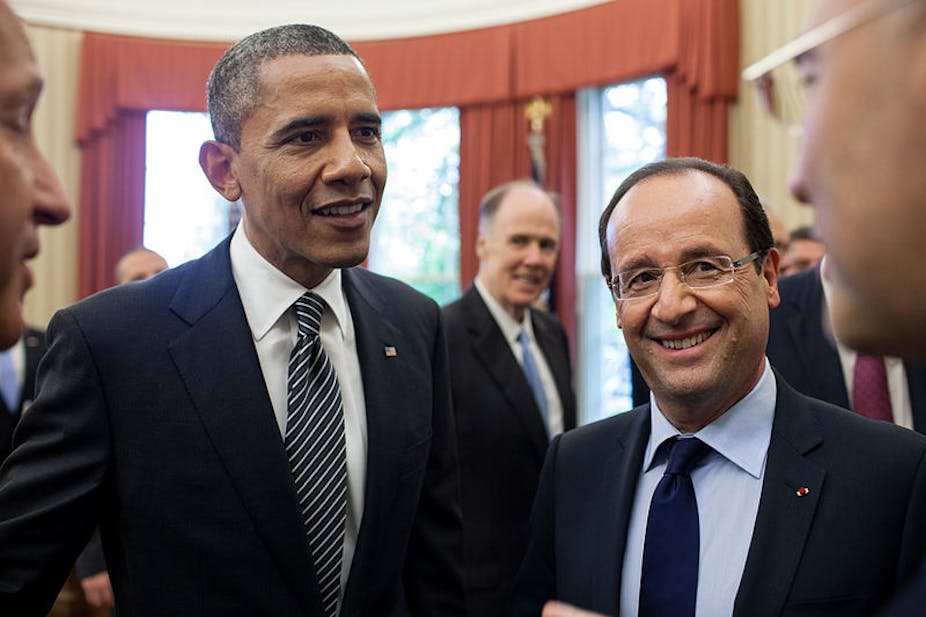While Barack Obama was getting the cold shoulder from Vladimir Putin in St Petersburg late last week, the mood was a great deal more cordial at the Quai d'Orsay in Paris as US secretary of state, John Kerry, met his French counterpart Laurent Fabius.
Speaking in French, Kerry recalled a meeting, 50 years ago, between John F Kennedy and Charles de Gaulle at which Kennedy said the relationship between France and the United States is essential for the preservation of freedom around the globe.
Said Kerry: “He also acknowledged something that we know very well at home, that our alliance with France has more than withstood the test of time, from the very days of our country’s existence through two world wars to the great partnership that exists today between president Obama and I and president Hollande and the foreign minister of France, M Fabius.”
So, no mention of “cheese-eating surrender monkeys”, “Freedom Fries” or the rather frosty relationship between Washington and Paris when George W Bush was in the White House, and Jacques Chirac in the Élysée Palace and Iraq was on the agenda.
With the defeat of David Cameron’s Commons motion to join the US in punitive air strikes against Syria 10 days ago, the importance of Francois Hollande’s support for the US position on Syria has moved US-French relations to centre stage.
The two countries have both nuanced their positions in recent days; France has suggested the best route may still be to wait for UN approval for intervention. Kerry, meanwhile, says that while the US sees no way forward through Security Council: “We have great respect for … president Hollande’s decision … the president of the United States has made no decision. I will return to Washington and obviously this will be a point of discussion.”
This sudden amity may surprise on both sides of the Atlantic. Not only has the UK rather than France been standing shoulder to shoulder with the USA since the Thatcher-Reagan alliance against the “evil empire” of the USSR and the Blair-Bush crusade against Saddam Hussein.
Many commentators claim that the clash over Iraq was but the latest episode of French anti-Americanism and the US pursuit of Anglo-Saxon hegemony. Indeed, France felt betrayed by the US over the 1956 Suez crisis in which Washington backed Egyptian president Gamel Abdel Nasser’s decision to nationalise the canal against the interests of Paris and London.
Subsequently, Charles de Gaulle withdrew his country from the military structures of NATO and sought to use European integration as a counterweight to the US-dominated transatlantic alliance.
All this, coupled with France’s defence of her ‘cultural exception’ (l’exception culturelle) against the growing Americanisation of French society, appears to underscore the deep divide between two countries.
Vive la révolution
However, such narratives ignore more fundamental commonalities that have their roots in a shared history. First of all, both countries grew out of revolutions in the late eighteenth century that purported to shake off the yoke of oppression – whether British colonial rule or the absolutism of the ancien régime.

And France and the US have similar constitutions: since US independence in 1776 and the French Revolution in 1789, both are secular republics that reject confessional monarchies in other parts of the West.
Religious language and imagery may be much more prominent in US public political life but since 1789 France has had her own version of “civil religion”: the first revolutionary constitution enshrined the notion of Supreme Being (l’Être suprême) and elevated the defence of human rights into the new national cult.
Third and crucially, both countries view themselves as exceptionalist powers with a unique mission in the world. France sees herself as the embodiment of universal civilisation – a vision that attracted much criticism and derision, including by French figures such as Voltaire.
The USA is founded upon the idea that it is the New Jerusalem – a “shining city on the hill” and a “beacon of democracy” to all the nations. Its divinely sanctioned mission is to spread freedom to the rest of the world – an exceptionalism that has shaped US policy from George Washington via Abraham Lincoln and Woodrow Wilson to George W Bush and now Barack Obama.
Of course countries that view themselves as exceptionalist tend to clash but this cannot mask mutual appreciation and close cooperation. Hollande’s predecessor Nicholas Sarkozy could barely hide his admiration for US power when he took France back into NATO’s integrated command structures in 2009.
France has been involved in military campaigns alongside the USA, in Afghanistan since 2001 and more recently in Libya in 2011 when the Franco-British imposition of a no-fly zone in Benghazi was supported by the Obama administration. With Hollande’s support for Obama over Syria, France is fast becoming America’s most loyal ally in Europe.
This comes at a time when other European countries are increasingly sceptical about interventions, including Germany, Poland and now the UK, where the hostility of public opinion is putting pressure on the governing elites.
Predictions about a “special relationship” between France and the US are premature. There are many in France who continue to harbour reservations about US intentions, most notably to divide and rule Europe. Likewise, Washington stills views London as its “closest ally” – in the words of Obama, when he announced his intention to launch military strikes after consulting the US Congress.
However, nobody should be surprised by the Franco-US alliance. Whatever the cultural differences and occasional political disagreements, the two countries share a long history of revolutionary regimes, constitutionally secular republics and an exceptionalist narrative that underpins their respective universal mission in the world. As the USA and France prepare to strike Syria, they and the rest of the world should remember this formative tradition.

